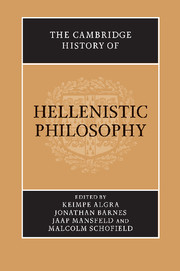Book contents
- Frontmatter
- PART I INTRODUCTION
- PART II LOGIC AND LANGUAGE
- PART III EPISTEMOLOGY
- PART IV PHYSICS AND METAPHYSICS
- 11 Hellenistic physics and metaphysics
- 12 Cosmology
- 13 Theology
- 14 Explanation and causation
- 15 Determinism and indeterminism
- 16 Epicurean psychology
- 17 Stoic psychology
- 18 Philosophy, science and medicine
- PART V ETHICS AND POLITICS
- Synopsis of principal events
- Editions of sources and fragments
- List of abbreviations
- Bibliography
- Index locorum
- General Index
- References
16 - Epicurean psychology
from PART IV - PHYSICS AND METAPHYSICS
Published online by Cambridge University Press: 28 March 2008
- Frontmatter
- PART I INTRODUCTION
- PART II LOGIC AND LANGUAGE
- PART III EPISTEMOLOGY
- PART IV PHYSICS AND METAPHYSICS
- 11 Hellenistic physics and metaphysics
- 12 Cosmology
- 13 Theology
- 14 Explanation and causation
- 15 Determinism and indeterminism
- 16 Epicurean psychology
- 17 Stoic psychology
- 18 Philosophy, science and medicine
- PART V ETHICS AND POLITICS
- Synopsis of principal events
- Editions of sources and fragments
- List of abbreviations
- Bibliography
- Index locorum
- General Index
- References
Summary
Introduction
In an age which has produced much agonizing over how to reconcile the life of the mind with a materialist physics, we are likely to feel an immediate affinity with an earlier theorist who combined the project of explaining human psychology with a commitment to the claim that ‘the totality of things is bodies and void’ (Epistula ad Herodotum 39). In common with the vast majority of modern psychologists and philosophers of mind, Epicurus was committed to atomistic materialism – and indeed, unlike that of most modern psychologists and philosophers, his commitment actually extended to arguing for the truth of that position. It was not a thesis which he accepted merely on authority. Like that of Aristotle in the generation before him, Epicurus’ psychology needs to be seen as part of an attempt to provide a complete natural philosophy. At least part of what he has to say about the psuchē is directly intended to show that his atomic theory is capable of explaining such complex natural phenomena as perception, thought and action. All of what he has to say is intended to be consistent with that physical theory.
This, however, places fewer constraints on what will count as a successful theory of the relation between the mental and the physical than is sometimes supposed. We are perhaps apt to be over-impressed by Epicurus’ espousal of atomism and to assume that, just by accepting the thesis that all material objects are divisible into atomic parts, he took on the task of showing that all the properties of material objects can be reduced to the states and movements of those parts.
- Type
- Chapter
- Information
- The Cambridge History of Hellenistic Philosophy , pp. 542 - 559Publisher: Cambridge University PressPrint publication year: 1999
References
- 4
- Cited by



